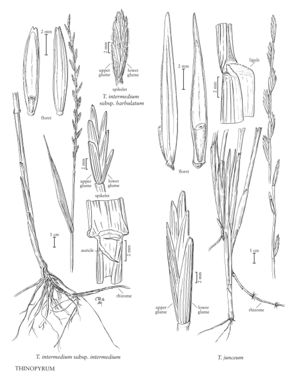Difference between revisions of "Thinopyrum junceum"
FNA>Volume Importer |
FNA>Volume Importer |
||
| Line 8: | Line 8: | ||
|name=Elytrigia juncea | |name=Elytrigia juncea | ||
|authority=unknown | |authority=unknown | ||
| − | }}{{Treatment/ID/Synonym | + | }} {{Treatment/ID/Synonym |
|name=Elymus farctus | |name=Elymus farctus | ||
|authority=unknown | |authority=unknown | ||
| − | }}{{Treatment/ID/Synonym | + | }} {{Treatment/ID/Synonym |
|name=Agropyron junceum | |name=Agropyron junceum | ||
|authority=unknown | |authority=unknown | ||
| Line 25: | Line 25: | ||
-->{{Treatment/Body | -->{{Treatment/Body | ||
| − | |discussion=<p>Thinopyrum junceum is native to the coast of Portugal, the Mediterranean, and the Black Sea. In the Flora region, it has been found on the coasts of southern California and Nova Scotia. In its native range, it grows on maritime rocky coasts, shifting beach sands, and, occasionally, by brackish water near river mouths.</p> | + | |discussion=<p><i>Thinopyrum junceum</i> is native to the coast of Portugal, the Mediterranean, and the Black Sea. In the Flora region, it has been found on the coasts of southern California and Nova Scotia. In its native range, it grows on maritime rocky coasts, shifting beach sands, and, occasionally, by brackish water near river mouths.</p> |
|tables= | |tables= | ||
|references= | |references= | ||
| Line 45: | Line 45: | ||
|publication year= | |publication year= | ||
|special status= | |special status= | ||
| − | |source xml=https://jpend@bitbucket.org/aafc-mbb/fna-data-curation.git/src/ | + | |source xml=https://jpend@bitbucket.org/aafc-mbb/fna-data-curation.git/src/8f726806613d60c220dc4493de13607dd3150896/coarse_grained_fna_xml/V24/V24_545.xml |
|subfamily=Poaceae subfam. Pooideae | |subfamily=Poaceae subfam. Pooideae | ||
|tribe=Poaceae tribe Triticeae | |tribe=Poaceae tribe Triticeae | ||
Revision as of 17:20, 18 September 2019
Plants not cespitose, rhizomatous. Culms 27-49 cm, glabrous; lowest internode plus sheath 3-8 mm thick. Sheaths glabrous; auricles absent; ligules 0.5-1.5 mm; blades 2-4 mm wide, convolute, abaxial surfaces glabrous, adaxial surfaces scabrous to densely pubescent, with 3-8 ribs, ribs narrow, prominent, margins not conspicuously thickened. Spikes 4-55 cm, erect; internodes 12-28 mm; rachises glabrous; disarticulation in the rachises. Spikelets 14-30 mm, appressed to the rachises, with 4-8 florets. Glumes lanceolate, glabrous, midveins slightly longer and more prominent than the lateral veins, apices obtuse to acute, often mucronate, margins not hyaline; lower glumes 10-18 mm, keeled, keels prominent; upper glumes 9-16 mm; lemmas 10-17 mm long, 2-4.5 mm wide, glabrous; paleas 9-14 mm, keels ciliate for almost their entire length; anthers 6-12 mm. 2n = 42, 56.
Discussion
Thinopyrum junceum is native to the coast of Portugal, the Mediterranean, and the Black Sea. In the Flora region, it has been found on the coasts of southern California and Nova Scotia. In its native range, it grows on maritime rocky coasts, shifting beach sands, and, occasionally, by brackish water near river mouths.
Selected References
None.
